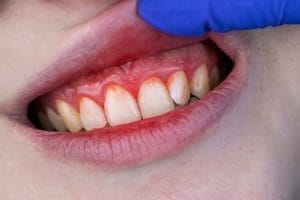 Utah is no stranger to extreme temperatures. Our state experiences blazing summers and freezing winters, where rainfall is scarce and low humidity is all around. All said it’s no wonder that Utah’s climate takes a toll on more than just your skin—it also makes your mouth dry, impacting your oral health.
Utah is no stranger to extreme temperatures. Our state experiences blazing summers and freezing winters, where rainfall is scarce and low humidity is all around. All said it’s no wonder that Utah’s climate takes a toll on more than just your skin—it also makes your mouth dry, impacting your oral health.
Unfortunately, dry mouth creates the perfect environment for gum disease to develop. Without enough saliva to wash away food particles and bacteria, you risk inflamed gums, which leads to redness, swelling, and even tooth loss if left untreated! However, there’s still a chance you might keep a healthy mouth.
With the right prevention tips and timely treatments, keep your gums healthy no matter how dry Utah’s climate gets.
Understanding Gum Disease
The term “gum disease” often gets thrown around, but have you fully understood its causes and symptoms?
This disease, also called “periodontal disease,” happens when plaque builds up on your teeth and along your gumline. You must remove it through proper brushing and flossing; otherwise, the sticky layer of bacteria hardens into tartar.
Tartar irritates your gum, and with Utah’s dry climate, it can worsen the problem by causing dry mouth, reducing the amount of saliva you produce to naturally combat harmful bacteria. This condition usually comes in two stages, which are mild and advanced.
- Gingivitis: The state of mild inflammation; the early stage of the disease
- Periodontitis: The advanced state that damages the bone and tissue supporting your teeth
Watch out for the following symptoms:
- Red, swollen, or tender gums
- Gums bleeding when you brush or floss
- Never-ending bad breath
- Receding gums or teeth that appear longer than usual
Poor oral hygiene and lifestyle habits (like smoking) can also cause inflammation to the gum. Certain medications and underlying health conditions like diabetes may also affect your gum’s conditions. Address these situations immediately to keep the disease from taking hold.
Prevention Tips for Utah’s Dry Climate
Observe the following oral survival skills to withstand Utah’s dry climate.
Stay hydrated
Drinking plenty of water is the simplest way to combat dry mouth. At the very least, you should always drink 8 cups (around 2 liters) a day, but for places with especially dry climate like Utah, it’s a good idea to drink an additional 0.5 to 1 liter per day.
You can also drink unsweetened tea, milk with reduced fat, and water from fruit to combat dehydration. Keep your mouth moist all the time to flush away bacteria.
Protect your mouth from dry air
The dry air around your mouth, especially during Utah’s cold winters, can worsen your dry mouth. Try these things:
- Using a humidifier in your home to add moisture to the air
- Chewing sugar-free gum to stimulate saliva production
- Wear a mask over your mouth when you go out in extreme temperatures
Consider at-home remedies
If you experience a mild gum irritation, rinsing with warm salt water can reduce inflammation. It’s also ideal to choose oral care products specifically designed for dry mouth (e.g., moisturizing mouthwashes or toothpaste.)
Another “treatment” option you can try at home is changing your diet to one with plenty of vitamins and minerals that support gum health.
Be consistent with your oral hygiene routine
Brushing and flossing are non-negotiable for healthy gums. Use fluoride toothpaste to strengthen your teeth and an antibacterial mouthwash to reduce plaque. Ensure that you brush for two minutes twice a day and floss daily to clean between your teeth.
Don’t forget to schedule dental cleanings regularly into your annual health routine. Get professional cleanings to remove plaque and tarter and treat other oral health issues.
Conclusion
Utah’s dry climate may pose challenges for your gums, which may end up causing gum disease, but consistent care will keep it at bay. Drinking plenty of water, protecting your mouth from dry air, using practical at-home remedies, and maintaining a good oral hygiene routine can help you prevent complications.
If the dryness continues and you start noticing other issues with your teeth and gum, schedule an appointment at our St. Georges Dental Office for a checkup.



Leave a Reply